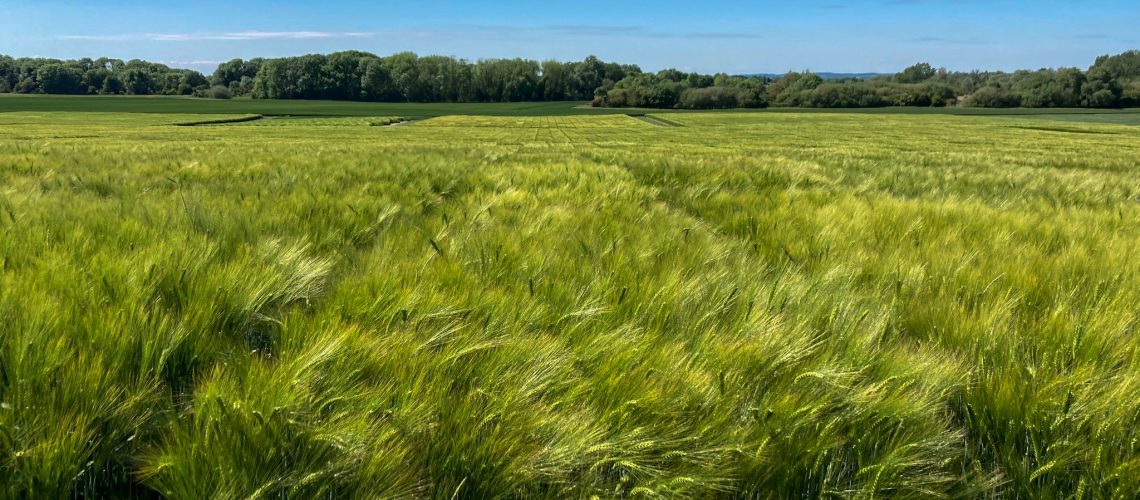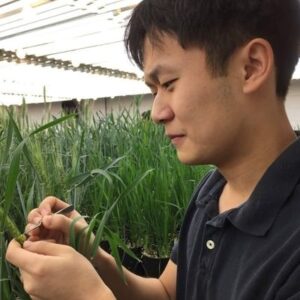

Andy Chen
PhD MECEA Winner 2023
My Journey in Wheat
- PhD MECEA Winner 2023
- | Part of MECEA
Ever since I was a teenager, I have been inspired by the “Golden Rice” story and amazed by how the application of plant sciences can have tremendous impacts on the world. This fascination has since driven me to dedicate my time and energy to contribute to the development of crops that can adapt to the changing climate and meet the nutritional needs of the human society.
I started my journey in wheat genetic as a MSc. student in the wheat breeding program at the University of Guelph in 2016. One of the biggest problems for winter wheat production in Canada was that most Canadian wheat cultivars are susceptible to winterkill due to the harsh Canadian winter. Winter survival ability of cultivars were scored based on visual inspection which had trouble detecting subtle difference between cultivars and is subjected to human error. To solve this problem, I decided to develop a drone-based phenotyping tool for screening winter wheat’s winter survival ability. However, with no prior knowledge in drone operation and image processing, this quickly became very difficult. I therefore collaborated with an expert in the industry. By the end of it, we developed a drone-based phenotyping pipeline that was faster and more precise than visual estimation (https://doi.org/10.1007/s00122-019-03373-6). To this day, this pipeline is still being used at the University of Guelph’s winter wheat breeding program to select for suitable cultivar for the area.
I continue my journey in the world of wheat genetic at the John Innes Centre in 2019 as a PhD student. This time, I had decided to take on the challenge of increasing grain yield in wheat. Grain size was shown to be positively correlated in wheat with the size of floral organs including lemma and palea. The wheat subspecies Triticum ispahanicum is known to develop elongated floral organs and this is controlled by a major QTL, P2, on chromosome 6A. To test out the effect P2 has on yield related traits, I established an international collaboration with Dr. Watanabe in Japan that had developed P2 near-isogenic lines. Using these lines, we found P2 can consistently increase grain length and therefore has the potential to increase grain weight and yield (https://doi.org/10.1007/s00122-019-03373-6). Through fine-mapping, we identified SHORT VEGETATIVE PHASE-A1 as a promising candidate and found T. ispahanicum has a 482-bp deletion in the promoter of SVP-A1. Using gene-editing, we found that the promoter deletion led to the ectopic expression of SVP-A1 in the floral organ during heading and is sufficient to increase glume length. We are excited about this as we will test these gene-edited lines in the field for yield related traits this summer to further advance precision breeding in the UK.
I am passionate about science communication and giving back to the wheat community. Despite the challenges brought by COVID, I have continued my outreach activities in the UK including giving a presentation at field tour, volunteering at the Norwich science festival, and engaging with local residents to talk about research activities happening at the John Innes Centre.
I recognized the impact my mentors have had on my career development and I want to pay it forward. I have written proposals to recruit students and supervised three students in learning research techniques in wheat genetics. In addition, I have actively participated in developing resources that can help future wheat scientists including contributing to the Wheat-Training.com website and delivering the Design Future Wheat Training workshop as part of a team. I am grateful to be doing research as part of a vibrant research community. In the future, I look forward to collaborating with more members of the wheat community in order to come up with creative solutions in improving wheat production.
